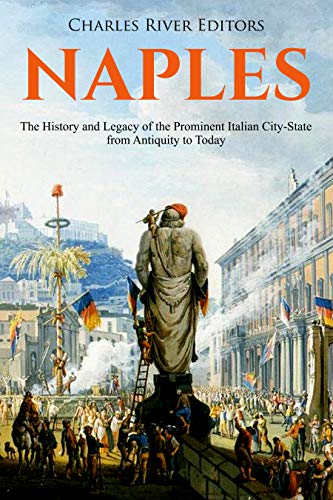Naples: The History and Legacy of the Prominent Italian City-State from Antiquity to Today
*Includes pictures*Includes a bibliography for further reading*Includes a table of contents The history of Naples is long and tortured, or at least for centuries that was how its history has been told. Inhabited almost continuously from the Neolithic era to the present, Naples was founded by the Greeks and conquered by the Romans. After the
*Includes pictures
*Includes a bibliography for further reading
*Includes a table of contents
The history of Naples is long and tortured, or at least for centuries that was how its history has been told. Inhabited almost continuously from the Neolithic era to the present, Naples was founded by the Greeks and conquered by the Romans. After the fall of the Roman Empire, Naples passed between various foreign rulers for its entire history prior to Italian unification. Starting in 1040, when the Norman French invaders conquered Campania, Naples was ruled in a dizzying succession by Germans, then French, then Spanish, then Austrians, then Spanish, then French, and then Spanish.
Although it is in many ways a microcosm of European history with a revolving door of conquerors, historians like to stress the unique status of Naples thanks to these diverse influences and unique geography. Set on a bay that provided a natural harbor, Naples is home to Mount Vesuvius, the only active volcano on the European mainland. When Vesuvius erupts, the Neapolitans pay the price, and it has earned its reputation as the most dangerous volcano in the world. However, the threat posed by Vesuvius is tempered by a great benefit: Naples is blessed with extremely fertile soil.
The natural harbor of Naples and its position on the southwest coast of Italy helps explain its history of multiple rulers, insofar as it made Naples a central locus of trade between Italy, Greece, Byzantium, North Africa, Spain, Holland, Flanders, and Germany. Due to its strategic importance, Naples reached high levels of prosperity, and for the same reason, it also suffered as various foreign powers vied for control of the city and the surrounding area.
All the while, the sheer beauty of the bay of Naples, with Vesuvius looming in the distance, has made Naples a place of endless fascination. It boasts imposing castles and fortresses, as well as twisty, turning medieval streets that are home to some of Italy’s poorest and most maligned residents. Across the bay are the islands of Capri and Ischia, which only add to the allure of the city. Furthermore, its cuisine – particularly its pizza (which was invented in Naples) and its richly sweet desserts – rates amongst the most appreciated in all of Italy, no doubt thanks to the fertility of the soil that favors agricultural production.
Nonetheless, Naples does not enjoy an excellent reputation, within the context of Italy or of Europe. High rates of petty crime, a decaying urban fabric and the infamous presence of the mafia (known in Naples as the Camorra) all combine to ensure fewer tourists venture to explore Naples, and many Italians (civilians and politicians alike) consider it the ultimate “problem city.” Nonetheless, it bears keeping in mind the words of one of Naples’ foremost historians, John Marino, who noted, “Naples, like each of Italy’s cities, [is] unique, but far less different than is generally believed.”
Today, historians have a different view of the twists and turns of the history of Naples, from the Greek founding and the Roman conquest, to the centuries under foreign rule and, finally, to its unification with Italy and present day challenges. Although Naples was constantly changing, many scholars now challenge the notion of Neapolitan tumult, arguing that it overshadows a more complex picture of a city that, in fact, enjoyed periods of stability and productivity.
Naples: The History and Legacy of the Prominent Italian City-State from Antiquity to Today dives into the city’s origin story, how it became one of the most important places in Europe, and its winding history. Along with pictures of important people, places, and events, you will learn about Naples like never before.
Bestsellers 2021
Auto Amazon Links: No products found.







Comments
Comments are disabled for this post.